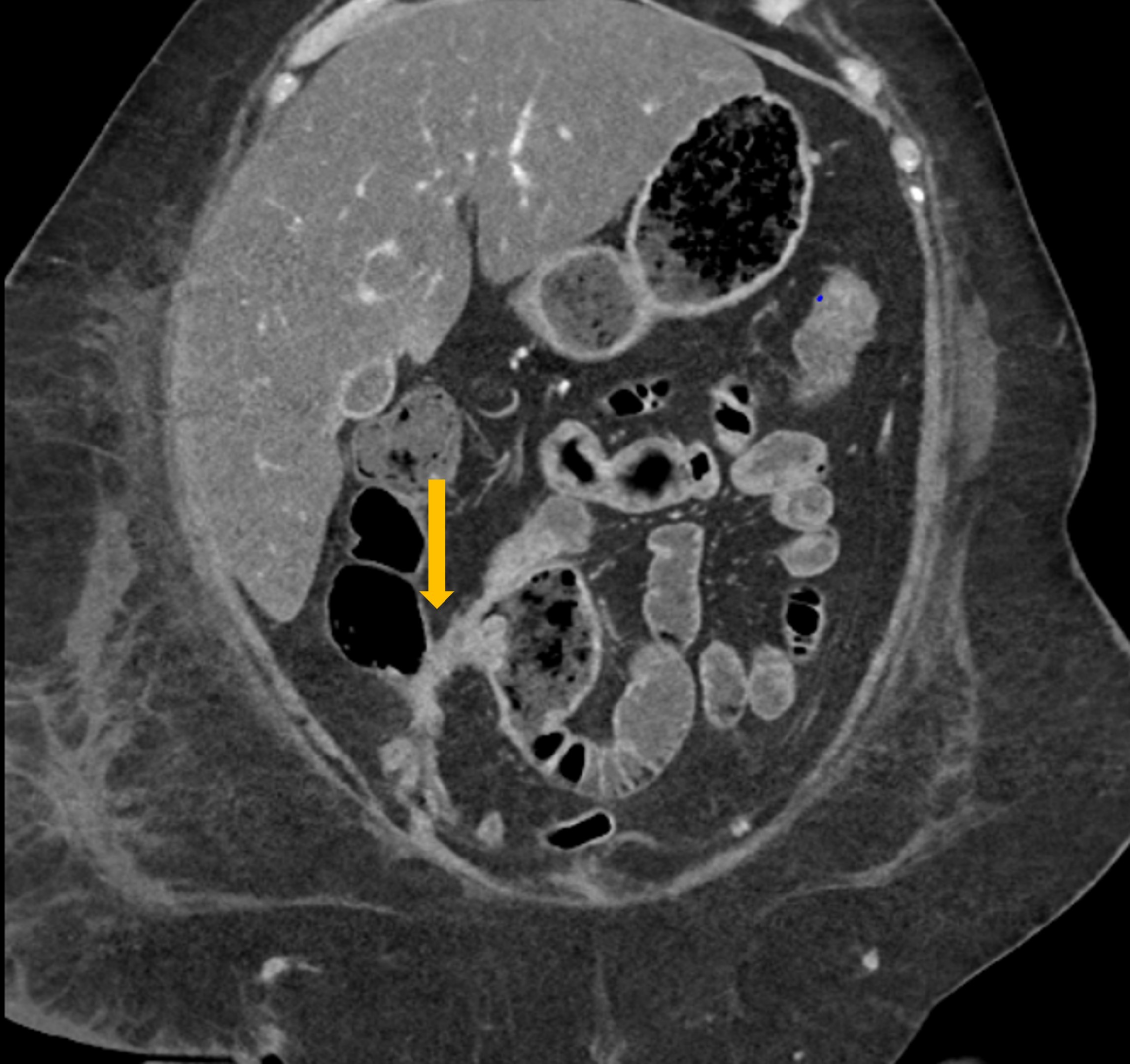Back
Poster Session C - Monday Afternoon
C0663 - Not All That Fistulizes Is Crohn’s Disease – Ischemic Jejunocolic Fistula
Monday, October 24, 2022
3:00 PM – 5:00 PM ET
Location: Crown Ballroom

Khushboo S. Gala, MD
Mayo Clinic
Rochester, MN
Presenting Author(s)
Khushboo S. Gala, MD, Victor Chedid, MD, MS
Mayo Clinic, Rochester, MN
Introduction: Enterocolic fistulae lead to abnormal diversion of gastrointestinal contents from the small intestine to the colon, causing diarrhea and protein energy malnutrition. We describe a rare case of a jejunocolic fistula due to chronic mesenteric ischemia leading to severe chronic diarrhea.
Case Description/Methods: A 40-year-old female with morbid obesity, nicotine dependence, type 2 diabetes mellitus was evaluated for epigastric pain and chronic diarrhea. She also had sitophobia and post-prandial urgency, with weight loss of 70 pounds over the last 6 months. She had been diagnosed with extensive thrombosis involving the abdominal aorta with extensions into the celiac artery, common hepatic artery, and left gastric artery, with evaluation revealing a JAK2 V617F mutant disorder. She was diagnosed with chronic mesenteric ischemia. For the evaluation of her diarrhea, she underwent an EGD with gastric and small bowel biopsies that was normal. CT enterography demonstrated an entero-colic fistula (jejunum to cecum). She underwent a colonoscopy which confirmed a 4 mm fistula in the cecum. Random colonic biopsies were normal, and biopsies from the fistula showed active chronic inflammation. Patient also has elevated calprotectin to 2600. Overall evaluation favored this isolated fistula in the setting of complex atherothrombotic disease to be from an ischemic origin rather than related to Crohn’s disease. The patient is currently being nutritionally optimized with plans for a surgical fistula takedown in the future.
Discussion: Enterocolic fistulae are complex conditions associated with high morbidity and mortality rates. Most fistulae occur following abdominal surgery, in the setting of infection or breakdown of an intestinal anastomosis due to ischemia, tension, or distal obstruction. Spontaneous fistula formation is uncommon (15-20% of cases), and causes include inflammatory bowel disease (specifically Crohn’s disease), diverticular disease, cancer, radiation enteritis and pancreatitis. Chronic ischemia is a very rare cause of spontaneous intestinal fistulization, with scant case reports described in literature. Enterocolic fistula can present with pain, diarrhea, and weight loss, and can be complicated by protein-energy malnutrition, abscesses, and sepsis. Management of the fistula depends on the underlying etiology, with importance given to nutritional optimization. Surgical takedown or endoscopic closure of fistulae remain a viable option in patients with localized disease.

Disclosures:
Khushboo S. Gala, MD, Victor Chedid, MD, MS. C0663 - Not All That Fistulizes Is Crohn’s Disease – Ischemic Jejunocolic Fistula, ACG 2022 Annual Scientific Meeting Abstracts. Charlotte, NC: American College of Gastroenterology.
Mayo Clinic, Rochester, MN
Introduction: Enterocolic fistulae lead to abnormal diversion of gastrointestinal contents from the small intestine to the colon, causing diarrhea and protein energy malnutrition. We describe a rare case of a jejunocolic fistula due to chronic mesenteric ischemia leading to severe chronic diarrhea.
Case Description/Methods: A 40-year-old female with morbid obesity, nicotine dependence, type 2 diabetes mellitus was evaluated for epigastric pain and chronic diarrhea. She also had sitophobia and post-prandial urgency, with weight loss of 70 pounds over the last 6 months. She had been diagnosed with extensive thrombosis involving the abdominal aorta with extensions into the celiac artery, common hepatic artery, and left gastric artery, with evaluation revealing a JAK2 V617F mutant disorder. She was diagnosed with chronic mesenteric ischemia. For the evaluation of her diarrhea, she underwent an EGD with gastric and small bowel biopsies that was normal. CT enterography demonstrated an entero-colic fistula (jejunum to cecum). She underwent a colonoscopy which confirmed a 4 mm fistula in the cecum. Random colonic biopsies were normal, and biopsies from the fistula showed active chronic inflammation. Patient also has elevated calprotectin to 2600. Overall evaluation favored this isolated fistula in the setting of complex atherothrombotic disease to be from an ischemic origin rather than related to Crohn’s disease. The patient is currently being nutritionally optimized with plans for a surgical fistula takedown in the future.
Discussion: Enterocolic fistulae are complex conditions associated with high morbidity and mortality rates. Most fistulae occur following abdominal surgery, in the setting of infection or breakdown of an intestinal anastomosis due to ischemia, tension, or distal obstruction. Spontaneous fistula formation is uncommon (15-20% of cases), and causes include inflammatory bowel disease (specifically Crohn’s disease), diverticular disease, cancer, radiation enteritis and pancreatitis. Chronic ischemia is a very rare cause of spontaneous intestinal fistulization, with scant case reports described in literature. Enterocolic fistula can present with pain, diarrhea, and weight loss, and can be complicated by protein-energy malnutrition, abscesses, and sepsis. Management of the fistula depends on the underlying etiology, with importance given to nutritional optimization. Surgical takedown or endoscopic closure of fistulae remain a viable option in patients with localized disease.

Figure: CT enterography demonstrating a jejunocolic fistula (yellow arrow).
Disclosures:
Khushboo Gala indicated no relevant financial relationships.
Victor Chedid indicated no relevant financial relationships.
Khushboo S. Gala, MD, Victor Chedid, MD, MS. C0663 - Not All That Fistulizes Is Crohn’s Disease – Ischemic Jejunocolic Fistula, ACG 2022 Annual Scientific Meeting Abstracts. Charlotte, NC: American College of Gastroenterology.
